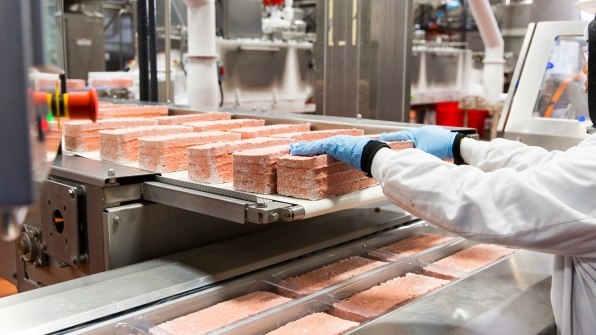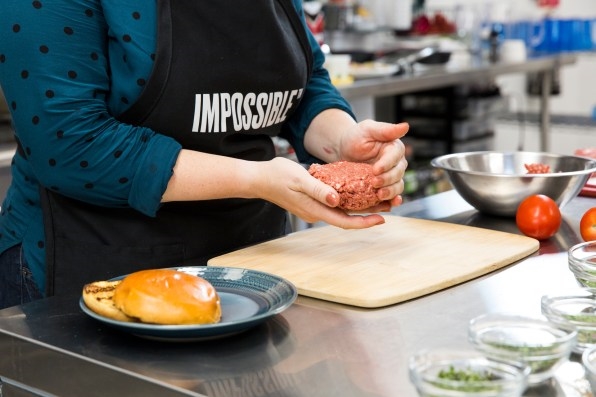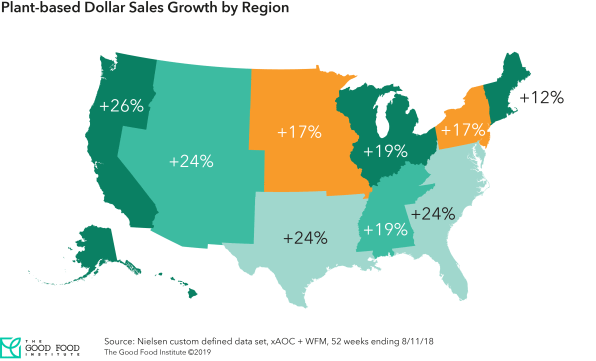It’s a good time to be in the plant-based meat business. Today, Impossible Foods, known for its very beef-like plant-based burger, announced that it closed a new $300 million funding round, bringing total venture investment in the company to more than three-quarters of a billion dollars. On April 29, Burger King said that it planned to start serving Impossible Whoppers nationwide. (The burger is already sold in more than 7,000 other restaurants–up from 70 just two years ago–and will be in retail stores later this year.) McDonald’s is serving a new vegan burger in Germany and a vegan Happy Meal in the U.K. Nestlé plans to start selling its own “Incredible Burger,” another realistic plant-based burger designed to be cooked from a raw patty, in Europe this spring, followed by the U.S. this fall. When Beyond Meat went public on May 2, its stock quickly soared.
“All of this is indicative of a public that is very, very excited about seeing meat produced from plants,” says Bruce Friedrich, executive director of the Good Food Institute, a nonprofit that focuses on the industry. Investment keeps growing. “There is overwhelming interest from investors in both the plant-based meat and ‘clean meat’ spaces,” he says. Over the past decade, more than $2 billion has been invested in plant-based meat, and more than half of that occurred in 2017 and 2018. (A total of $16 billion has been invested in plant-based meat, egg, and dairy companies combined since 2009, according to a recent report from the nonprofit.) Some of that investment has come from the traditional meat industry, including Tyson Foods, and from food giants like Nestle.

The success is being driven by the evolution of the products, which now bear little relation to old-school veggie burgers. “This is fundamentally an issue of rethinking what a plant-based burger is,” says Friedrich. Impossible uses a plant-based version of heme, the same molecule that gives blood its taste. Beyond Meat, like Impossible, has a massive lab where scientists continually tweak the recipes for its products to make them as realistic as possible. The target customers aren’t vegetarians anymore, but meat eaters who are interested in alternatives for health or animal welfare reasons, or because raising meat is a contributor to climate change. “The products are getting better and better, and that’s a factor in going from, ‘My products are for the billion-dollar vegetarian plant-based meat market,’ to, ‘My products are for the $200 billion everybody-who-eats-meat market,” he says. “And you really need to be in the latter category to have a successful fast food introduction.”

Plant-based meat sales, like sales of plant-based dairy, are outpacing sales of traditional meat. In a report released in September 2018 that looked at data from the past 12 months, sales of plant-based meat grew 23%, while regular meat grew only 2%. Beyond Meat’s sales had grown 70%. Around 30% of American consumers now say that they’re reducing their meat consumption, and 32% consider themselves flexitarian.

Buyers for restaurant chains and managers who make decisions about future products for mainstream food companies are now choosing to support plant-based meat as consumer demand increases. “Historically, making the decision to bring on a plant-based burger in McDonald’s would have been a very risky decision to make,” says Chris Kerr, cofounder and chief investment officer of New Crop Capital, one of the venture capital firms investing in the industry. “So why would you put your job at risk and your reputation at risk to take on a veggie burger? That has shifted the other way. If you’re in that position of influence, and you don’t take that risk, you’ll actually miss out, and you’ll be the one who kind of came in behind competition.” Since 2008, the menu penetration of the term “vegan” on menus in the U.S. has grown 490%.

A decade ago, Kerr says, when Beyond Meat was beginning to work on its product, it was much harder to get investment. But as the products improved and consumers became more interested, that started to change. “It shifted around 2012, and Silicon Valley really started paying a lot more attention to it,” he says. “And that’s because it was more than a trillion-dollar industry, and nobody was really messing with it, and quite frankly, it deserves to be disrupted.” Now, he believes that plant-based meat could follow–albeit more slowly–the trajectory of plant-based dairy, which now has around 10% of the market share of an industry that had been largely unchanged for centuries. That might mean that plant-based meat moves from a billion-dollar industry to a $20 billion industry.
It’s likely now that many more products will begin to come to market, both from startups and larger companies. Tyson Foods, one of the world’s largest meat producers, plans to introduce plant-based meats this year. Most types of meat and seafood still don’t have realistic plant-based alternatives. “Over the next 10 years, we’re going to see a whole bunch of new brands, new products, and technologies that just didn’t exist five years ago,” says Andrew Ive, managing general partner of Big Idea Ventures, a venture firm that is launching a new accelerator later this year in New York City and Singapore to help bring some of those brands to market. As that change happens, he says, it will have a meaningful benefit for the environment. “It’s a big opportunity. And the great thing about it is that if we do our job right, and we deliver a lot of delicious foods that just happen to not have animal protein or animal byproducts in them, it has a really significant impact on climate.”
(37)